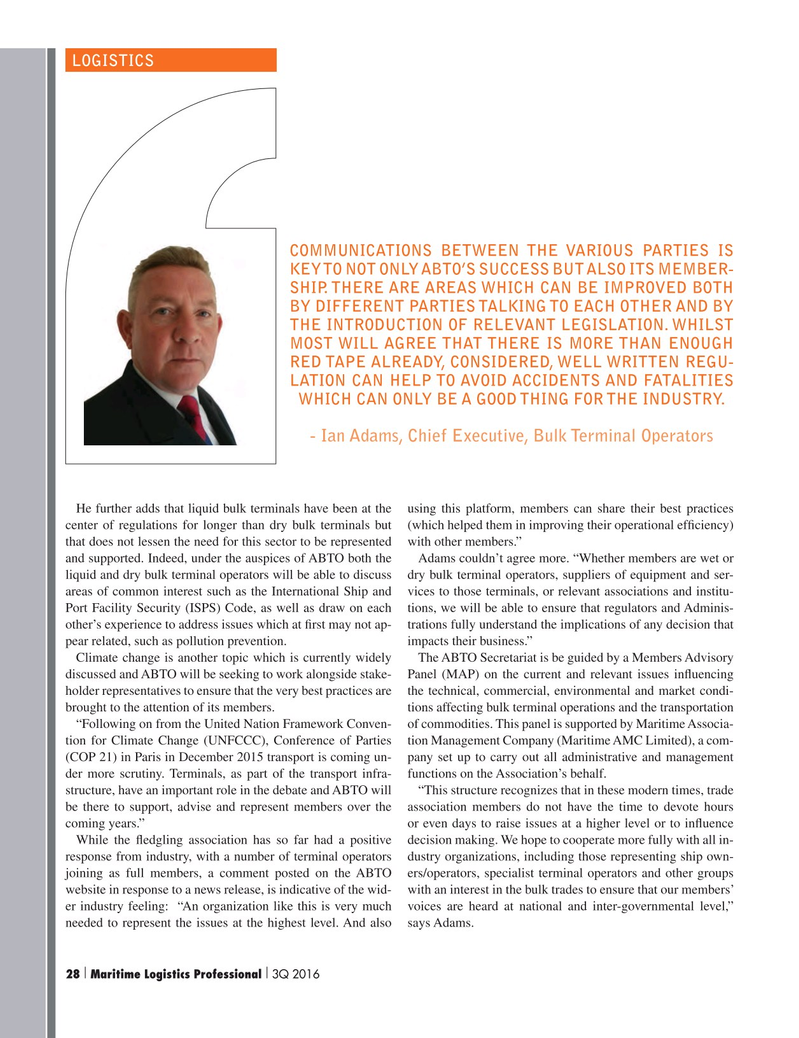
Page 28: of Maritime Logistics Professional Magazine (Q3 2016)
Shipbuilding, Repair & Maintenance
Read this page in Pdf, Flash or Html5 edition of Q3 2016 Maritime Logistics Professional Magazine
LOGISTICS
COMMUNICATIONS BETWEEN THE VARIOUS PARTIES IS
KEY TO NOT ONLY ABTO’S SUCCESS BUT ALSO ITS MEMBER-
SHIP. THERE ARE AREAS WHICH CAN BE IMPROVED BOTH
BY DIFFERENT PARTIES TALKING TO EACH OTHER AND BY
THE INTRODUCTION OF RELEVANT LEGISLATION. WHILST
MOST WILL AGREE THAT THERE IS MORE THAN ENOUGH
RED TAPE ALREADY, CONSIDERED, WELL WRITTEN REGU-
LATION CAN HELP TO AVOID ACCIDENTS AND FATALITIES
WHICH CAN ONLY BE A GOOD THING FOR THE INDUSTRY.
- Ian Adams, Chief Executive, Bulk Terminal Operators
He further adds that liquid bulk terminals have been at the using this platform, members can share their best practices center of regulations for longer than dry bulk terminals but (which helped them in improving their operational ef? ciency) that does not lessen the need for this sector to be represented with other members.” and supported. Indeed, under the auspices of ABTO both the Adams couldn’t agree more. “Whether members are wet or liquid and dry bulk terminal operators will be able to discuss dry bulk terminal operators, suppliers of equipment and ser- areas of common interest such as the International Ship and vices to those terminals, or relevant associations and institu-
Port Facility Security (ISPS) Code, as well as draw on each tions, we will be able to ensure that regulators and Adminis- other’s experience to address issues which at ? rst may not ap- trations fully understand the implications of any decision that pear related, such as pollution prevention. impacts their business.”
Climate change is another topic which is currently widely The ABTO Secretariat is be guided by a Members Advisory discussed and ABTO will be seeking to work alongside stake- Panel (MAP) on the current and relevant issues in? uencing holder representatives to ensure that the very best practices are the technical, commercial, environmental and market condi- brought to the attention of its members. tions affecting bulk terminal operations and the transportation “Following on from the United Nation Framework Conven- of commodities. This panel is supported by Maritime Associa- tion for Climate Change (UNFCCC), Conference of Parties tion Management Company (Maritime AMC Limited), a com- (COP 21) in Paris in December 2015 transport is coming un- pany set up to carry out all administrative and management der more scrutiny. Terminals, as part of the transport infra- functions on the Association’s behalf.
structure, have an important role in the debate and ABTO will “This structure recognizes that in these modern times, trade be there to support, advise and represent members over the association members do not have the time to devote hours coming years.” or even days to raise issues at a higher level or to in? uence
While the ? edgling association has so far had a positive decision making. We hope to cooperate more fully with all in- response from industry, with a number of terminal operators dustry organizations, including those representing ship own- joining as full members, a comment posted on the ABTO ers/operators, specialist terminal operators and other groups website in response to a news release, is indicative of the wid- with an interest in the bulk trades to ensure that our members’ er industry feeling: “An organization like this is very much voices are heard at national and inter-governmental level,” needed to represent the issues at the highest level. And also says Adams.
28 Maritime Logistics Professional 3Q 2016| | 18-33 Q3 MP2016.indd 28 8/17/2016 11:32:39 AM

 27
27

 29
29
